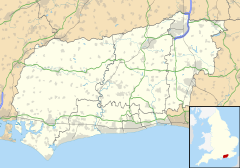Bedham
| Bedham | |
|---|---|
 The former Bedham School |
|
| Bedham shown within West Sussex | |
| OS grid reference | TQ0121 |
| District | |
| Shire county | |
| Region | |
| Country | England |
| Sovereign state | United Kingdom |
| Post town | Pulborough |
| Postcode district | RH20 1 |
| Dialling code | 01798 |
| Police | Sussex |
| Fire | West Sussex |
| Ambulance | South East Coast |
| EU Parliament | South East England |
Bedham is a hamlet 4 kilometres (2½ miles) east of Petworth in the Chichester District of West Sussex, England. It is in the civil parish of Wisborough Green.
Bedham consists of a farm, a derelict Victorian school, and a scattering of houses set high on a wooded sandstone ridge of the western Weald, at 150 metres above sea level. To the west Flexham Park is an area of commercial woodland, with large areas of chestnut coppice, and south of this is a sandstone quarry at Bognor Common. To the northeast are large areas of semi-natural forest, left unmanaged as a nature reserve, called The Mens. South of The Mens is Hawkhurst Court, a country house used as a Canadian army HQ in the buildup to the Normandy Invasion during World War II, then as a private school, before becoming private housing in the 1980s.
From the early 20th century Bedham became popular with artists of limited means who wanted to "escape from civilisation". Remote cottages could be bought for £100. The composer Sir Edward Elgar lived nearby at Brinkwells for a time as a sub-tenant of the artist Rex Vicat Cole, and the studio where Elgar composed his Cello Concerto was moved up to the village and now stands as a separate house. Ford Madox Ford, author of The Good Soldier also lived in the village with Stella Bowen, an Australian artist twenty years his junior. Later residents included Miss Ethel West (d.1950) and her companion Miss Metherell who lived in Bedham Cottage - Miss Metherell using the pen name Rhoda Leigh wrote a fictional account of the hamlet, Past and Passing: Tales from Remote Sussex, which offended some local residents with its thinly veiled and exaggerated references to them. One of those offended was Mrs. Puttick who sold groceries, tobacco and sweets from the kitchen of her house opposite the lane to Warren Barn.
...
Wikipedia

